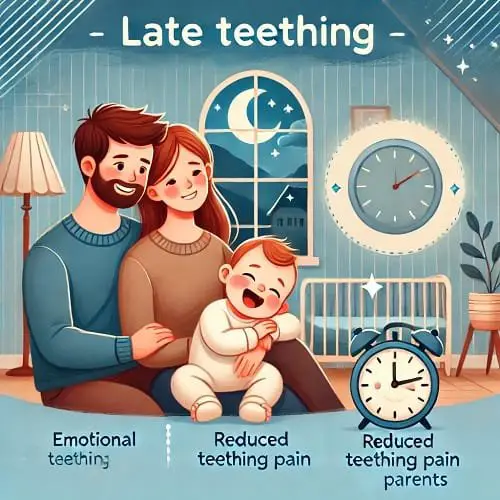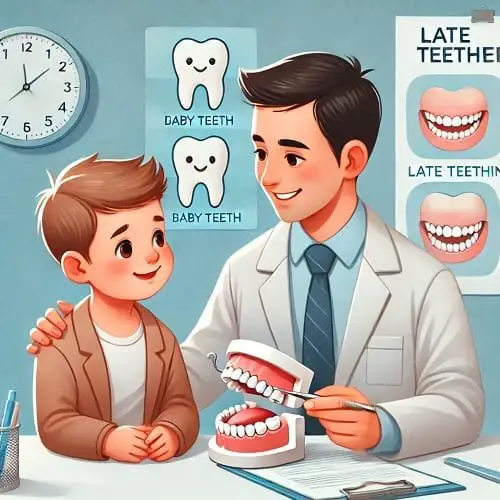1. Introduction
When it comes to a baby’s teething timeline, parents often find themselves comparing milestones with others. However, delayed tooth eruption isn’t necessarily a cause for concern. In fact, there are several benefits of late teething that parents should celebrate rather than worry about.
Late teething, which typically refers to a child developing their first tooth after 12 months of age, is a natural variation rather than a problem. As children grow at their own pace, their developmental milestones, including baby tooth eruption, can vary widely. While the process may test a parent’s patience, it’s important to understand the potential advantages tied to this delay.
This article dives deep into the benefits of late teething, exploring its impact on dental health benefits and overall developmental milestones. By the end, parents will feel reassured and informed, viewing late teething as a unique advantage rather than a setback.
Table of Contents
- 1. Introduction
- 2. Understanding Late Teething
- 3. Developmental and Health Benefits of Late Teething
- 4. Emotional and Behavioral Benefits of Late Teething
- 5. How Parents Can Support Late Teething Babies
2. Understanding Late Teething

Late teething is a term used when a baby’s first tooth appears later than the average teething range, which usually starts around 6 months. For some babies, their teething stages are naturally delayed, with teeth emerging after the first year. While this might raise questions, it’s often due to normal factors like genetics and nutrition.
What Causes Late Teething?
Several factors contribute to late teething causes, including:
- Genetic factors in teething: If parents teethed late as infants, their baby may follow suit.
- Nutritional influences: Adequate calcium, vitamin D, and phosphorus intake are crucial for healthy tooth development, and deficiencies can contribute to delays.
- Prematurity: Babies born prematurely might experience a delay in reaching teething milestones, along with other developmental milestones.
How Late Teething Differs from Early Teething
Unlike early teething, late teething may bring unique advantages, as the delay often results in stronger and better-formed teeth. The process allows for more mineralization, reducing the likelihood of cavities. While early teething might sound desirable, it can sometimes lead to challenges such as overcrowding or weaker enamel.
Debunking Myths About Late Teething
There’s a common misconception that late teething signals a developmental issue or illness. However, this isn’t true for most children. Pediatricians and dentists often reassure parents that variations in the baby tooth eruption timeline are perfectly normal and seldom indicate a deeper problem.
By understanding the natural rhythm of teething stages, parents can let go of unnecessary worries and embrace the potential benefits of late teething for their child.
3. Developmental and Health Benefits of Late Teething

Late teething might seem concerning to some parents, but it comes with a host of surprising advantages. From oral health advantages to better overall growth alignment, the benefits of late teething extend beyond dental health, positively impacting a child’s development in multiple ways.
1. Better Oral Health Outcomes
One of the most significant teething delay benefits is a reduced risk of cavities. When teeth emerge later, they are less exposed to foods and drinks that can contribute to decay during early feeding stages. Parents also have more time to prepare for proper oral hygiene practices, ensuring that their child’s teeth receive the care they need from the very beginning. This delayed timeline can lead to healthier teeth in the long run.
2. Stronger Enamel
Late teething often means better enamel strength. Teeth that develop later tend to go through more mineralization, resulting in stronger enamel. This can protect the teeth from damage, decay, and sensitivity. Stronger enamel is especially beneficial as children grow and are introduced to a variety of foods that could potentially wear down weaker teeth.
3. Improved Dental Alignment
Late teething is also associated with better dental alignment. When teeth erupt later, they tend to align more naturally, reducing the chances of overcrowding or misalignment. Proper spacing between teeth contributes to easier cleaning, reducing the risk of oral health issues like plaque buildup or gum disease. This alignment can also decrease the need for orthodontic interventions, such as braces, later in life.
4. Correlation with Other Developmental Milestones
Interestingly, late teething often aligns with slower, steadier growth patterns in other areas of a child’s development. For instance, babies who teeth later might also take longer to transition to solid foods, allowing their digestive systems more time to mature. This steadiness can promote healthier, more sustainable development overall. Late teething is a natural part of some children’s unique growth trajectories, rather than an anomaly or concern.
The benefits of late teething highlight how nature often works in a child’s favor, even when timelines differ. By understanding these oral health advantages and broader developmental perks, parents can feel reassured about their child’s progress and focus on supporting their growth in a positive and informed way.
4. Emotional and Behavioral Benefits of Late Teething

While late teething is often viewed as a delay, it offers numerous emotional and behavioral advantages for both babies and their parents. The benefits of late teething extend beyond physical health, fostering a calmer, more harmonious experience during this milestone.
1. Reduced Teething Discomfort
Late teething is typically accompanied by less teething pain, as babies’ gums are more developed and resilient by the time teeth begin to emerge. This minimizes discomfort, making the process easier for both the baby and their caregivers. The reduced irritability allows parents to focus on bonding rather than managing excessive crying or pain relief.
2. Improved Temperament During Teething
Because late teething often involves reduced irritability, it can result in fewer disruptions to a baby’s sleep and feeding routines. Babies who teeth later are less likely to experience prolonged discomfort that can lead to mood swings or restless nights. This not only improves the baby’s temperament but also ensures parents get more consistent rest.
3. Positive Impact on Parental Bonding and Care
The calmer nature of delayed teething comfort fosters stronger parental bonding. Parents feel more at ease and confident when their baby isn’t struggling with severe teething pain. This creates a nurturing environment, allowing for more positive interactions during this important developmental stage.
By understanding the emotional and behavioral benefits of late teething, parents can appreciate this natural timeline and focus on fostering a stress-free and supportive environment for their child.
ALSO READ
How Long Does Sleep Training Take? Step-by-Step Timelines and Advice
How to Get Your Newborn to Sleep in a Bassinet: Proven Tips for Peaceful Nights
5. How Parents Can Support Late Teething Babies

Supporting a baby through late teething involves a mix of practical strategies and informed care. By focusing on nutrition, oral hygiene, and professional guidance, parents can ensure their baby benefits fully from the benefits of late teething.
1. Dietary Considerations
Nutrition plays a critical role in supporting healthy oral care for babies. Incorporating foods rich in calcium, phosphorus, and vitamin D helps strengthen emerging teeth and gums. Examples include fortified cereals, dairy products, and leafy greens. For babies not yet on solids, ensuring that formula or breast milk meets their nutritional needs is equally important.
2. Teething Toys and Remedies
Providing safe and effective teething tips is crucial. Cooling teething toys can help soothe tender gums, while gentle massages provide relief. Parents should prioritize products that are non-toxic and designed specifically for babies.
3. When to Consult a Pediatric Dentist
If parents have concerns about the timeline or progression of their baby’s teeth, seeking pediatric dentist advice is a smart step. Dentists can assess whether the delay is within normal limits and provide tips to ensure proper dental development.
4. Maintaining Oral Hygiene
Oral care starts even before teeth erupt. Gently cleaning a baby’s gums with a soft cloth can prevent bacteria buildup and prepare them for regular brushing routines later on. Once teeth begin to emerge, parents should use a soft toothbrush and a rice-sized amount of fluoride toothpaste to keep them clean.
By following these teething tips and focusing on nutrition for teething, parents can actively support their late-teething baby while maximizing the developmental and emotional benefits of late teething.
6. Addressing Parental Concerns About Late Teething

It’s natural for parents to have questions and worries about late teething, but understanding the facts can help ease these concerns. The benefits of late teething far outweigh any perceived disadvantages, and recognizing this can provide much-needed peace of mind.
1. Common Worries About Late Teething
Parents often wonder whether teething concerns like delayed tooth eruption indicate underlying health or developmental issues. Fears about slow growth, poor nutrition, or even developmental delays are common, but most of these worries stem from misconceptions rather than facts.
2. Late Teething Is Not a Developmental Delay
Experts in pediatric dental health agree that late teething is usually a normal variation and not a sign of delayed development. While every child grows at their own pace, delayed development myths can lead to unnecessary stress. Late teething is often linked to genetic factors or individual growth patterns rather than a cause for alarm.
3. Focusing on Overall Growth and Well-Being
Instead of fixating solely on teeth, parents are encouraged to look at the bigger picture of their child’s health. Ensuring proper nutrition, regular pediatric check-ups, and a supportive environment for growth are far more important than adhering to a strict baby dental milestones timeline. By understanding the positives, parents can confidently embrace the benefits of late teething and focus on their child’s overall well-being.
7. FAQs About the Benefits of Late Teething
Parents often have lingering questions about late teething. Here are answers to the most common inquiries, designed to clear doubts and provide reassurance.
1. How Late Is Considered “Too Late” for Teething?
Typically, the first tooth appears between 6-12 months. If no teeth have erupted by 18 months, consult a pediatric dentist to rule out any underlying issues.
2. Does Late Teething Mean My Child Will Have Stronger Teeth?
Yes, late teething often leads to stronger enamel due to longer mineralization periods, which can result in healthier and more resilient teeth.
3. Are There Long-Term Health Benefits to Late Teething?
Absolutely. Better dental alignment, reduced cavity risk, and overall improved oral health are some of the long-term benefits of late teething.
4. Should I See a Dentist If My Baby Hasn’t Started Teething?
If teething hasn’t begun by 18 months, it’s advisable to seek pediatric dentist advice to ensure there are no underlying issues, though late teething is often perfectly normal.
8. Conclusion
The benefits of late teething are numerous, encompassing both oral health and emotional well-being. Parents can rest assured that late teething often leads to stronger, healthier teeth and smoother development overall.
By focusing on the positive aspects and embracing expert recommendations, parents can turn late teething into a unique advantage for their child. Regular dental check-ups, supportive care, and a focus on overall health are key to making the most of this natural milestone. Embrace the final thoughts on teething with positivity and confidence, knowing that every child’s growth journey is beautifully unique.






